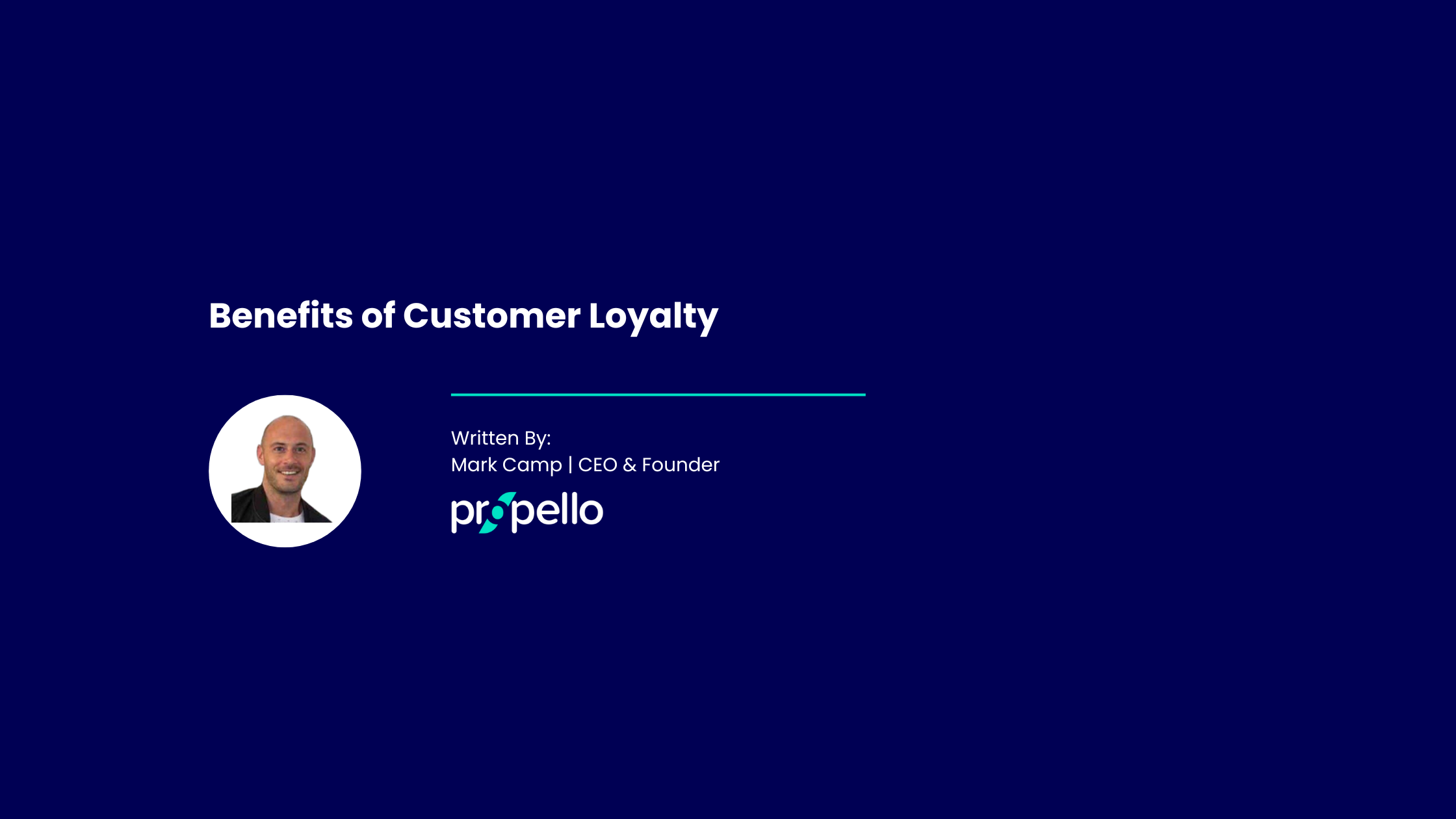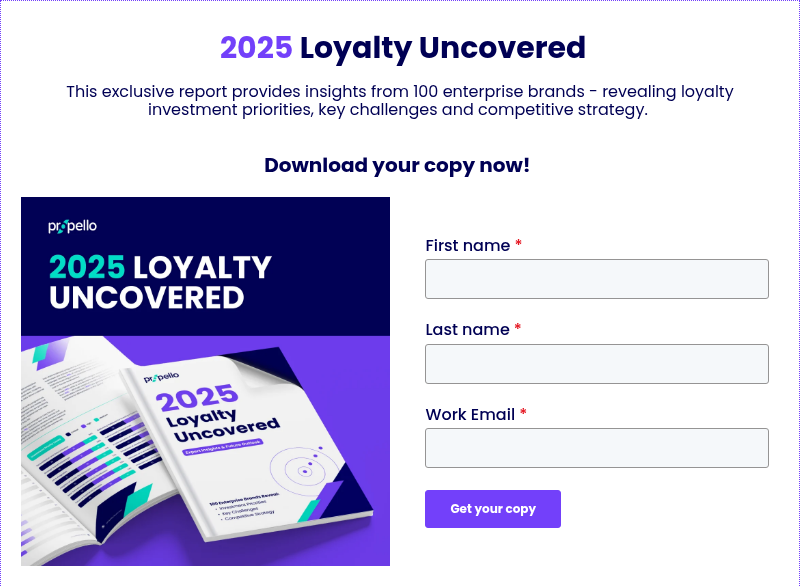Key takeaways
-
Customer loyalty is when a customer consistently chooses your brand over competitors, even if it means paying more or waiting longer for your products and services.
-
Investing in customer loyalty is more cost-effective than acquiring new customers, as it can boost profits by 25% to 95% and reduce customer acquisition costs.
-
Delivering exceptional customer service, personalised experiences, and consistent value strengthens emotional connections, boosts retention, and drives word-of-mouth marketing.
-
Loyal customers become brand advocates, sharing positive experiences through word-of-mouth, social media, and online reviews, attracting new customers without substantial advertising costs.
-
A loyal customer base provides a competitive advantage, as emotionally connected customers are less likely to switch to competitors, allowing for pricing power and market differentiation.
What is Customer Loyalty?
At its core, customer loyalty is when a customer consistently chooses your brand over competitors. These are the people who stick with you even if it means occasionally paying a bit more or waiting a little longer for your products and services.
Why is Customer Loyalty Important?
Loyal customers are the backbone of any successful business. Not only do they tend to spend more, they also provide invaluable customer feedback and are your most passionate brand advocates.
Plus, customer acquisition can be up to five times pricier than retaining existing customers, which is why investing in customer loyalty is a no-brainer for your bottom line.
The loyalty spectrum
One key concept I always keep in mind is the loyalty spectrum. On one end, you've got your die-hard brand enthusiasts who wouldn't dream of going elsewhere. They're the ones eagerly spreading the word about your business to their friends and family and providing insights to help you improve.
On the other end of the spectrum are customers who may be more easily lured away by competitive offers or pricing. The secret is to continually nurture your customer relationships, guiding them along the spectrum towards deeper brand affinity.
Delivering exceptional customer service, personalised experiences, and consistent value are key drivers of customer loyalty. Strengthening these emotional connections over time, boosts customer retention, valuable word-of-mouth marketing, and ultimately, a healthier bottom line for your business.
11 Key Benefits of Customer Loyalty
As a loyalty marketing expert, I've witnessed firsthand the incredible benefits our clients enjoy after cultivating a loyal customer base. When you prioritise customer retention and create meaningful relationships with your audience, you unlock a wealth of advantages that are transformative to businesses.
Let's dive into the rewards of customer loyalty and explore how it can impact your financial, marketing, and operational success.
1) Cut costs - increases retention
While many businesses focus their marketing budget on acquiring new customers, the truth is that retaining customers is far more cost-effective. Delivering exceptional products and services, coupled with personalised experiences, keeps your customers coming back for more. This repeat business not only boosts your revenue but also provides a stable foundation for growth.
Whereas acquiring new customers is most often a costly endeavour, requiring significant investments in marketing and advertising. With a loyal customer base, you can reduce your customer acquisition costs.
That’s because loyal customers are more likely to recommend your brand to their friends and family, essentially becoming your brand advocates. This word-of-mouth marketing is not only cost-effective but also highly influential in attracting new customers.
Studies show that acquiring a new customer can be up to five times more expensive than retaining existing customers.
Increasing customer retention rates by just 5% can boost profits by 25% to 95%. The Pareto Principle also suggests that 20% of your loyal customers account for 80% of your income, contributing 67% more than new customers on average.
Loyal customers are five times more likely to make repeat purchases, forgive bad experiences, provide referrals, and try new products and services. Building customer loyalty is a low-risk, high-reward strategy for maintaining income streams and minimising wasted resources.
2. Customer insight and data to create personalised experiences
Access to valuable data allows you to personalise your marketing efforts, tailor your product or service offerings, and identify areas for improvement. You can make data-driven decisions that enhance the customer experience and strengthen your relationships with loyal customers using a CRM, a customer loyalty programme or a combination of both.
Analysing data from a loyalty programme can provide valuable insights into your customers' demographics and spending habits. This information allows you to tailor your marketing campaigns to each customer's needs, leading to increased sales.
As you gather data through ongoing customer relationships, you can gain insights into their buying behaviour and preferences, which can be used to optimise the customer experience or improve your products or service. Repeat business is essential for creating detailed customer profiles that can't be achieved through single transactions.
Increasing personalisation in your customer interactions also boosts customer loyalty. It's a positive feedback loop where more customer journey data leads to increased loyalty and revenue. That’s why loyalty programmes are a goldmine for valuable customer data. They are a means for gathering reliable feedback from engaged customers eager to help you expand your value proposition.
3. Boosts revenue through customer lifetime value
Another significant financial benefit of customer loyalty is the increase in Customer Lifetime Value (CLV). When customers remain loyal to your brand, they continue to make repeat purchases over an extended period, resulting in a higher overall value per customer.
In other words, Customer Lifetime Value (CLV) represents the net revenue attributed to a single customer. Customer loyalty increases CLV and strengthens the bond between your brand and your customers by providing an additional reason for them to stick with you beyond product or service quality. Loyal customers are more likely to :
-
Engage with your brand's marketing efforts
-
Refer friends and family
-
Provide valuable feedback that can help you optimise your value proposition bringing in more customers.
Additionally, with a higher CLV your company can allocate more resources towards enhancing customer experiences and investing in long term growth strategies.
4. Improved engagement
Engaging with customers is crucial since it has a direct effect on the longevity of a business. A brand with poor recall value and a poor public image is usually guilty of failing to meaningfully engage its target demographic. A loyalty programme is an excellent strategy for improving customer engagement.
When customers sign up for a company's loyalty or rewards programme, they are more likely to engage with the personalised rewards on offer. The programme creates a dialogue between the brand and the customer and improves the bond and trust between both parties. This ongoing interaction provides the company with valuable insights into customer preferences and behaviours, enabling more personalised and relevant marketing efforts.
Furthermore, loyalty programmes often include:
-
Exclusive offers
-
Early access to new products
-
Special rewards that make customers feel valued and appreciated.
A sense of exclusivity and recognition significantly enhances customer satisfaction and incites FOMO in most people. Another thing to mention about engaged customers; they are more likely to share their positive experiences on social media and other platforms. This amplifies your brand's reach, attracting new potential customers through word-of-mouth recommendations.
5. Drives innovation
Maintaining a loyal customer base requires a company to innovate consistently. Customers will remain loyal if they continue to receive value from your offerings, which means staying up-to-date with industry developments and finding new ways to improve your service delivery.
Prioritising your customers' dynamic needs is a direct driver of brand innovation. As you adapt to their requirements, you’ll begin to see the benefits of innovation. Particularly with regards to customer acquisition and retention. Engaged and loyal customers provide valuable feedback and insights that spur new ideas and improvements.
Innovative practices driven by customer loyalty helps attract new customers in addition to retaining existing ones. The cycle of innovation and loyalty ensures that your brand remains relevant and competitive in rapidly evolving markets.
6. Creates brand advocates
One of the most powerful marketing tools at your disposal is the positive word-of-mouth generated by your loyal customers. When customers have a great experience with your brand, they are more likely to share their enthusiasm with others.
These personal recommendations and referrals carry significant weight, as people trust the opinions of their loved ones. Leveraging the power of word-of-mouth marketing, expands your reach and attracts new customers without incurring substantial advertising costs.
Focusing on loyal customers not only encourages them to return but also to invite their friends and family. If customers have a positive experience with your business, they will spread the word about your brand.
Encouraging brand advocates to promote your business increases your chances of attracting new customers and selling to those unfamiliar with your brand.
In fact, 76% of respondents trust content from "normal" people more than brand content, making word-of-mouth referrals more effective than aggressive marketing techniques.
7. Develops emotional connections
To stand out in a world saturated with advertisements, you need to provide valuable information and interactions that go beyond standard discounts and rewards. Reorienting your marketing efforts to prioritise customer loyalty over new purchases is key.
Loyal customers will continue to buy from you even if competitors offer steep discounts. The intangible bonds between a brand and its customers are more powerful than any monetary value your products or services may have.
You can differentiate yourself and establish a rapport with your customers by aligning your offerings with customer values and forming partnerships with established brands that cater to their interests.
8) Enhanced Reputation and Trust
Consistently positive experiences with your brand not only build trust and a positive reputation but also create a ripple effect in attracting more customers and improving your brand image. When customers have a satisfying experience, they are more likely to share their positive experiences through word-of-mouth, social media, or online reviews.
A positive reputation is a valuable asset that establishes credibility and reliability. Customers are more likely to choose a brand with a positive reputation, as it gives them confidence in the quality of products or services they will receive.
Plus, let’s not forget that loyal customers are not just passive consumers; they are active advocates for your brand. They are passionate about your products and services and are eager to share their positive experiences with others. This strong brand advocacy helps to increase your brand's visibility and recognition in the market.
As more people hear about your brand through the enthusiastic recommendations of your loyal customers, your brand's reputation and credibility grow, making it easier to attract new customers and establish a strong market presence renowned for its trustworthy reputation.
9) Cross-selling and Upselling Opportunities
Loyal customers present valuable opportunities for cross-selling and upselling. By understanding their preferences and needs, businesses can effectively promote additional products or services that align with their interests.
Leveraging the loyalty and trust of existing customers boosts revenue, increases average transaction value, and strengthens the relationship between the brand and its customers. Loyal customers appreciate personalised recommendations and feel valued when businesses understand their specific needs.
Moreover, loyal customers are more receptive to upsell and cross-sells offers because they already trust the brand. Remember, trust is absolutely essential for successful customer loyalty.
Positive perceptions combined with consistently meeting and exceeding customer expectations, creates a cycle of repeat purchases and sustained customer loyalty.
10) Valuable Feedback for Improvement
Loyal customers often provide constructive feedback, which is valuable for businesses seeking to improve and refine their offerings. Actively listening to feedback and suggestions helps identify pain points or areas of dissatisfaction, allowing businesses to make necessary adjustments to enhance the customer experience.
When customers feel heard and valued, they are more likely to continue supporting the brand and recommending it to others. This strengthens the relationship between the business and its loyal customers while attracting new customers through positive word-of-mouth referrals.
Actively seeking and listening to customer feedback, you can identify areas where your business excels and uncover opportunities for growth. This feedback loop enables you to continuously refine your offerings, address pain points, and exceed customer expectations.
11) Competitive Advantage
Having a loyal customer base gives you a significant competitive advantage in your industry. When customers are emotionally connected to your brand and trust in the value you provide, they are less likely to be swayed by competitors' offerings.
Satisfied customers are less likely to switch to competitors offering similar products or services. This loyalty allows you to maintain a certain level of pricing power, as loyal customers are often willing to pay a premium for the quality and experience they associate with your brand.
This is precisely why a loyal customer base backing you up is a route to differentiate yourself from competitors and command a stronger position in the market. A loyal customer base ensures ongoing business from existing customers and acts as a magnet for new customers, driving sustainable growth and success.
Boost Customer Loyalty with a Rewards Programme
The benefits of customer loyalty speak for themselves — lower acquisition costs, higher revenue, deeper customer insights, and a competitive edge that’s hard to replicate. But true loyalty isn’t just about points and perks; it’s about building meaningful relationships that stand the test of time.
So, how are leading brands rethinking loyalty in 2025?
👉 Download our latest report, Loyalty Uncovered 2025 — a must-read for marketers looking to stay ahead. Discover the newest trends, strategies, and innovations transforming customer loyalty, with insights you can apply to your business right now.
FAQs
What is customer loyalty?
Customer loyalty is when a customer consistently chooses your brand over competitors, even if it means paying more or waiting longer for your products and services. Loyal customers are the backbone of any successful business, spending more, providing valuable feedback, and acting as passionate brand advocates.
Why is customer loyalty important for businesses?
Customer loyalty is crucial for businesses as it leads to increased profitability, reduced customer acquisition costs, and sustainable growth. Loyal customers spend more, provide valuable feedback, and act as brand advocates, attracting new customers through word-of-mouth marketing and positive reviews.
How can businesses measure customer loyalty?
Businesses can measure customer loyalty through various metrics, such as customer retention rate, repeat purchase rate, customer lifetime value (CLV), net promoter score (NPS), and customer satisfaction scores.
What are the benefits of implementing a customer loyalty programme?
Implementing a customer loyalty programme offers several benefits, including increased customer retention, higher customer lifetime value, valuable customer data and insights, improved customer engagement, and enhanced brand advocacy.
How can businesses create emotional connections with customers?
To create emotional connections with customers, businesses should focus on delivering exceptional customer service, personalised experiences, and consistent value. Meaningful relationships through valuable interactions, aligning with customer values, and forming strategic brand partnerships strengthen emotional bonds.
What role does personalisation play in customer loyalty?
Personalisation plays a crucial role in customer loyalty by making customers feel valued and understood. By leveraging customer data and insights, businesses can tailor their offerings, communications, and experiences to individual preferences, leading to increased engagement, satisfaction, and loyalty.
How can businesses encourage customers to become brand advocates?
Businesses can encourage customers to become brand advocates by consistently delivering positive experiences, exceeding expectations, and providing incentives for referrals and reviews. Engaging with customers through social media, loyalty programmes, and personalised interactions can also foster brand advocacy.
What are the financial benefits of customer loyalty?
The financial benefits of customer loyalty include increased profitability, reduced customer acquisition costs, and higher customer lifetime value. Loyal customers tend to spend more, make repeat purchases, and are less likely to switch to competitors, contributing to sustainable revenue growth.
How can businesses use customer feedback to improve loyalty?
Businesses can use customer feedback to identify areas for improvement, refine their offerings, and exceed customer expectations. Actively seeking and listening to feedback from loyal customers through surveys, reviews, and customer support interactions provide valuable insights for enhancing the customer experience.
What role does a positive reputation play in customer loyalty?
A positive reputation built through consistently positive customer experiences establishes credibility, reliability, and a strong market presence. It attracts new customers, reinforces loyalty among existing customers, and provides a competitive advantage, as customers are more likely to choose a reputable brand over competitors.
Author Bio, Written By:
Mark Camp | CEO & Founder at PropelloCloud.com | LinkedIn
Mark is the Founder and CEO of Propello Cloud, an innovative SaaS platform for loyalty and customer engagement. With over 20 years of marketing experience, he is passionate about helping brands boost retention and acquisition with scalable loyalty solutions.
Mark is an expert in loyalty and engagement strategy, having worked with major enterprise clients across industries to drive growth through rewards programmes. He leads Propello Cloud's mission to deliver versatile platforms that help organisations attract, engage and retain customers.




.png)